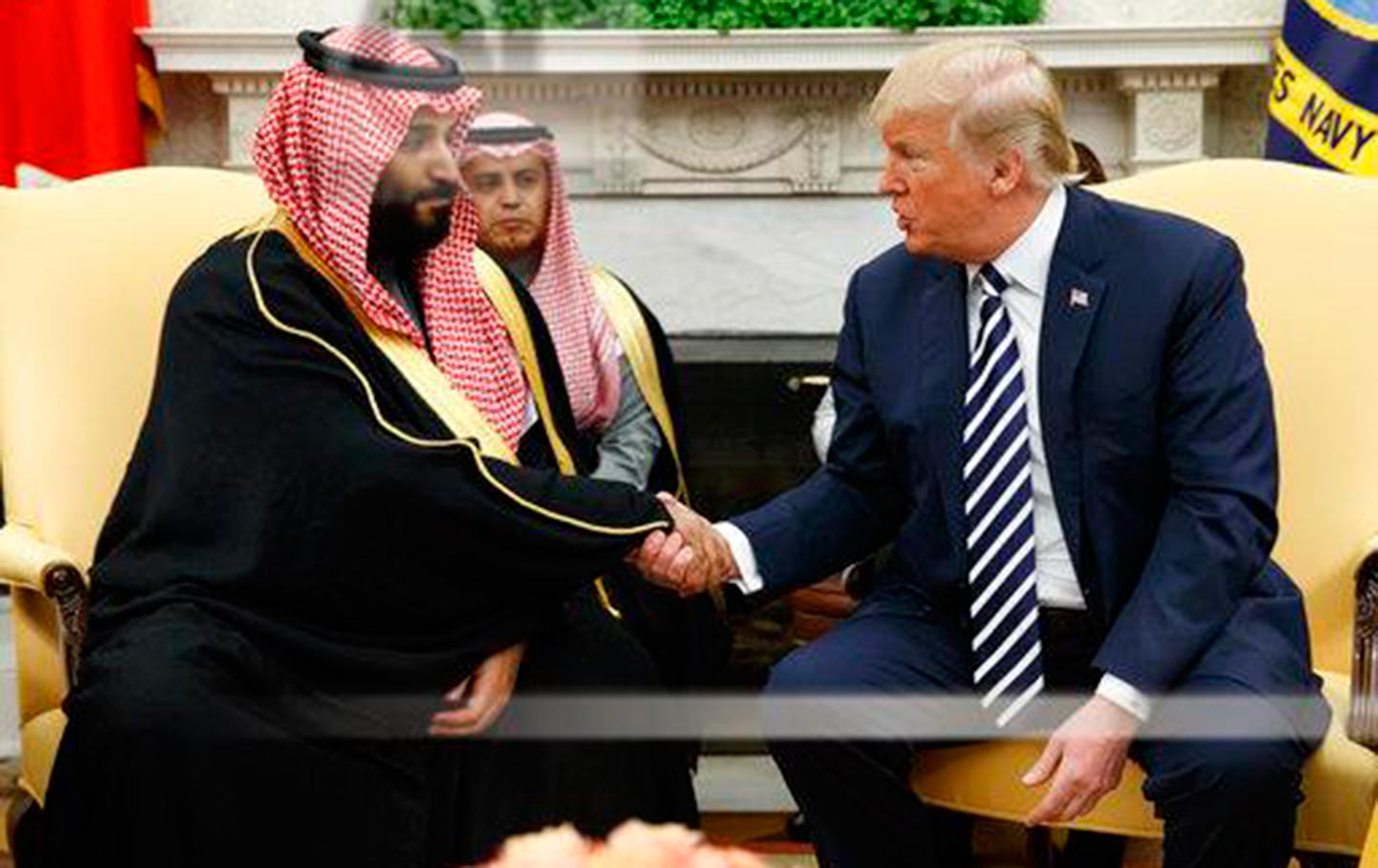Trump Is Blowing Up Soft Power
And he’s shooting America’s diplomats in the foot.

As the Trump administration tightens its grip on government, it is branding diplomacy as personal theater and sidelining the institutions that once sustained it—trading soft power and lasting influence for fleeting spectacle. What’s being lost isn’t just influence but also understanding.
For this reason, “soft power,” a term coined by the late Harvard political scientist Joseph Nye to describe influence through attraction rather than coercion, may be better understood today as “soft diplomacy”: Washington’s ability to understand other societies—and for those societies to understand America.
Understanding, on its own, doesn’t guarantee sound foreign policy—especially when it’s routinely used to justify a reflexive commitment to American primacy, military intervention, or zero-sum competition. But dismantling global engagement, educational exchange, and soft diplomacy all but ensures worse outcomes—and makes it harder to carry out good policies when they do emerge. By tying diplomacy to the president’s personal brand—as if it belongs to one person or administration—the US erodes its long-term credibility and undermines the very diplomats charged with carrying it out.
Burning Down the Architecture of Public Diplomacy
Washington’s hard power—an enormous military budget and the global financial machinery to impose often-ineffective but punishing sanctions—comes with privileges and pathologies. Americans move through the world with ease. We swipe our credit cards without issue, rarely need visas, and treat US territorial integrity as a given. With the expansion of militarism during the Global War on Terror era also came the erosion of civil liberties, bloated defense spending, and new federal law enforcement agencies like ICE.
What’s less discussed are the quiet benefits of our soft diplomacy. Global elites and ambitious students still flock to US universities. US ambassadors often lack fluency in the local language—something unimaginable for their foreign counterparts in Washington. English, which became a global lingua franca thanks to the British Empire, owes much of its continued dominance to the cultural and economic influence of the United States and decades of educational and professional exchange. Even when political anti-Americanism flares, it rarely manifests as a wholesale rejection of American culture or people.
Overall, polling shows that while America is viewed positively, it is met with skepticism, especially when promoting its foreign policy as a force for good. The wistfulness that once greeted American travelers abroad—a mix of curiosity, aspiration, and the quiet hope of getting a US visa—has faded over the past two decades. The Bush administration’s unpopular invasion of Iraq, Washington’s unflinching support for Israel—including using it as a pretext to deport foreign students and even green-card holders—harsh and complicated immigration rules, and improving conditions in parts of the Global South have all given people plenty of reasons to look elsewhere.
But this moment feels more extreme. The erosion of soft power or diplomacy is no longer passive or incidental—it’s deliberate. Washington isn’t just retreating from global engagement. It’s burning the boats that once kept it tethered to the world.
First, the Trump administration targeted USAID. While the agency still exists on paper, it’s been effectively dismantled. A January 20 executive order froze nearly all foreign aid and later a directive placed most USAID staff worldwide on paid leave. By early 2025, over 80 percent of USAID’s portfolio—roughly 5,000 contracts and grants—had been canceled.
Secretary of State Marco Rubio has publicly blasted the State Department as “bloated” and overly bureaucratic, announcing plans to eliminate over 100 bureaus and cut roughly 15 percent of Foreign Service staff. At the same time, the administration launched a controversial “deferred resignation ” program aimed at downsizing the federal workforce. In January 2025, a “Fork in the Road” e-mail offered federal employees full pay and benefits through September if they agreed to resign. Around 75,000 federal employees across agencies took the deal. A second buyout round began in April, according to an internal memo.
Other government agencies have also been gutted. A March 2025 order disbanded the Pentagon’s Office of Net Assessment, and in April, the Woodrow Wilson Center was effectively shut down—nearly all employees were put on leave, locked out of e-mail, and told they’d be fired as part of the Musk-led Department of Government Efficiency (DOGE) task force. Similarly, the US Institute of Peace (USIP) was ordered dismantled in March. DOGE forcibly entered its headquarters and removed board members. Court orders have restored some of USIP’s functions but the damage is effectively done.
The harsh treatment of public servants has sparked an outpouring of support—and, in some quarters, an aggrandizing narrative about the work of USAID and other public diplomacy. These institutions were not without flaws. Agencies like USAID and public diplomacy efforts sometimes operated alongside US military interventions, and it could be argued they occasionally helped whitewash those wars by adding a humanitarian veneer or justification. Too often, privileged local elites acted as native informants, designing projects to win US contracts while sidelining more sustainable, grassroots efforts. Some initiatives produced underwhelming results driven more by optics than impact. However, many USAID and similar initiatives were deeply impactful—driving real economic development and improving key measures of human well-being. A serious, methodical reform effort could have separated the wheat from the chaff.
Instead, an entire generation of young and mid-career Americans who sought to serve—inside or alongside the government—were cast aside. The lesson is clear: Work for the US government at your own peril. LinkedIn is filled with posts from veteran diplomats and public servants stepping down, many saying they feel unwanted or worn down by the uncertainty. Many won’t return, and it’s increasingly unclear why any ambitious young person would choose to step in.
Popular
“swipe left below to view more authors”Swipe →The End of Academic Exchange
The United States has long served as the world’s classroom, with its universities attracting more international students than any other country by a wide margin. But under the Trump administration, that role is rapidly unraveling. After mass visa revocations triggered lawsuits and brief reinstatements, the administration resumed its crackdown in May. US embassies were ordered to halt new F-1 and J-1 visa interviews to implement expanded ideological and social media vetting. Secretary Rubio confirmed that the freeze would remain until new country-specific rules—starting with China and Hong Kong—are finalized. Rubio also threatened to “aggressively revoke visas” for Chinese students. A politically motivated executive order stripped Harvard of the ability to host foreign students—a move that will likely revoke thousands of student visas lest they transfer.
Some student visas were revoked over minor infractions—like fishing without a license. Others were linked to political expression, including pro-Palestinian activism as mild as writing an op-ed. At the same time, the nominee for director of US Citizenship and Immigration Services announced his intention to end Optional Practical Training (OPT), a program that allows international students to work in the US for one to three years after graduation. Killing OPT would gut one of the few remaining pathways for high-skilled foreign workers—especially in STEM fields—to enter the US. Ending OPT would significantly disrupt major industries like finance and tech, even though studies show that OPT workers do not reduce opportunities for citizens. The intent would be to discourage any foreign students from choosing the US for their studies.
Meanwhile, the Fulbright Program, once the crown jewel of American soft power, has been effectively dismantled. In February 2025, the administration froze all State Department scholarships, cutting off stipends for thousands of US and international Fulbright students. Many were notified by abrupt e-mails. Trump’s FY2026 budget proposes a staggering 93 percent cut to educational exchange programs, and a leaked (later disavowed) memo floated limiting Fulbright to only national security–related master’s degrees. The Department of Education followed suit by canceling all 2025 Fulbright-Hays competitions. Meanwhile, the Department of Defense is cutting funding for one-third of its university-based Language Flagship programs, affecting key languages such as Chinese, Arabic, and Russian.
What happens when the world stops understanding America—and the few Americans who once tried to understand the world are pushed aside? We’re about to find out.
One-Man Diplomacy
Some of President Trump’s instincts on diplomacy offer a welcome jolt to Washington’s overly technocratic culture. In a town where diplomacy is often sterile, procedural, and overly cautious, Trump’s unvarnished bluntness and willingness to meet adversaries without preconditions can feel refreshingly direct and human. It unsettles the Beltway but sometimes resonates abroad.
Dissolving USAID, shuttering research institutions, and sidelining the State Department will not streamline diplomacy. By tying America’s diplomacy exclusively to the persona of the president, the Trump administration is hollowing it out.
This path is not irreversible. The administration can cut or refocus programs it finds too soft, too ideological, or too costly—without burning down the architecture of American soft diplomacy. A deal-making, business-minded White House should see value in continuing to attract the world’s future political and economic leaders, not drive them away mid-degree and leave them with a lasting grievance. President Trump has made similar points in the past—tweeting, “When foreigners attend our great colleges & want to stay in the US, they should not be thrown out of our country,” and suggesting during his last campaign that foreign students should even be granted permanent work authorization.
Maintaining the ability to conduct soft diplomacy won’t guarantee better policy. Foreign policy is still largely made in the White House. But capacity matters. Most signs suggest we’re continuing down the path of dismantling that capacity—not because it’s a core priority for President Trump, but because those around him are settling scores with the very institutions that carry it out.
The costs of not righting the boats may take years to show, but it will be lasting: a world that understands—and sympathizes with—America far less than it does today, and a generation of Americans who know even less about the world they’re inheriting.
More from The Nation

The False Premise of European Rearmament The False Premise of European Rearmament
Have European leaders stopped to consider the Orwellian implications of gearing up their nations for perpetual war?

I Went to a US-Backed “Aid” Site In Gaza. It Was Hell on Earth. I Went to a US-Backed “Aid” Site In Gaza. It Was Hell on Earth.
The scene resembled throwing meat into a cage of starving lions, letting them fight for their own survival.

Greater America Has Been Exporting Disunion for Decades Greater America Has Been Exporting Disunion for Decades
So why are we still surprised when the tide of blood reaches our own shores? Some personal reflections on Marco Rubio and me—and the roots of Trump’s imperial ambitions.

The Wild Lives of Cargo Ships The Wild Lives of Cargo Ships
A capacious new history examines the remaking of the the global economy through the story a single barge.

Why Is Trump Suddenly Sidelining Israel? Why Is Trump Suddenly Sidelining Israel?
If Israel gets in the way of deal-making with the Gulf plutocrats, it could become an annoyance that Trump might feel he can’t afford.

President Trump Is Demolishing America’s Global Soft Power President Trump Is Demolishing America’s Global Soft Power
Trump’s sharp cuts to humanitarian aid will ensure that the United States’ soft power crumbles, doing lasting damage to its international standing.


